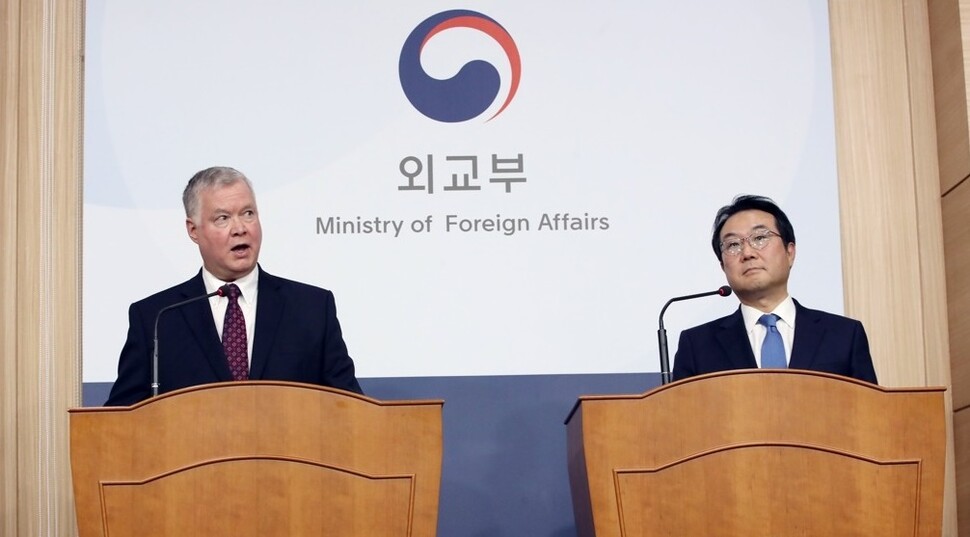hankyoreh
Links to other country sites 다른 나라 사이트 링크
[Editorial] US needs to back inter-Korean cooperation with action, not words

“We have reconfirmed the US government’s support for improving inter-Korean relations,” said Lee Do-hoon, South Korea’s special representative for Korean Peninsula peace and security affairs, following a meeting with US Deputy Secretary of State Stephen Biegun in Washington on Jan. 17. To be sure, Lee also stressed cooperation between the two countries, noting that they’d furthermore “agreed to cooperate closely in regard to inter-Korean relations, the complete denuclearization of the Korean Peninsula, and the establishment of a lasting peace.” Nevertheless, it’s meaningful that the two governments would publicize such agreements amid the dispute sparked by remarks made by US Ambassador to Seoul Harry Harris.
Last week, Harris said that matters such as individual tourism to the Mt. Kumgang resort should be dealt with in the South Korea-US working group “in order to avoid a misunderstanding later that could trigger sanctions,” provoking a fierce backlash from the South Korean government and public. It’s encouraging that the US has issued remarks that can be taken as acknowledging to some extent that the South Korean government can play a leading role in inter-Korean relations. What’s important, however, is for the US to clarify its support not only in principle but also in the details of inter-Korean economic cooperation.
Previously, there have been multiple occasions in which the US has paid lip service to inter-Korean relations while actually using sanctions to obstruct South Korean efforts to improve those relations. One example was when the UN Command refused to approve plans by South and North Korea to survey the current condition of North Korean railroads in August 2018. The US government needs to recognize that, from time to time, advances in inter-Korean relations can lead to progress in North Korea-US relations.
Current North Korea-US relations effectively show that the Trump administration’s unrelenting grip on North Korean sanctions has jeopardized the denuclearization negotiations. While North Korea should also be proactive about dialogue, the main thing needed to overcome these difficulties is for the American government to adopt a flexible attitude. South Korean President Moon Jae-in expressed his desire to improve inter-Korean cooperation by allowing individual tourism to the North in his New Year’s address, and we believe that the US’ firm support for such an initiative is urgent for resuming North Korea-US dialogue. If individual tourism is to be realized, the governments of South and North Korea ought to engage in concrete deliberations to ensure that tourists don’t fall victim to UN sanctions. We hope that the US will back up the South Korean government’s drive for economic cooperation through deeds, and not merely words.
Even more important is persuading North Korea to adopt a forward-looking attitude. Even with cooperation from the US, there’s no hope of improving inter-Korean relations, whether they consist of economic cooperation or person-to-person exchange, as long as North Korea refuses to take part. Seoul needs to make every effort to persuade Pyongyang to open the door to meaningful inter-Korean cooperation.
Please direct comments or questions to [english@hani.co.kr]

Editorial・opinion
![[Column] Season 2 of special prosecutor probe may be coming to Korea soon [Column] Season 2 of special prosecutor probe may be coming to Korea soon](https://flexible.img.hani.co.kr/flexible/normal/500/300/imgdb/original/2024/0426/3317141030699447.jpg) [Column] Season 2 of special prosecutor probe may be coming to Korea soon
[Column] Season 2 of special prosecutor probe may be coming to Korea soon![[Column] Park Geun-hye déjà vu in Yoon Suk-yeol [Column] Park Geun-hye déjà vu in Yoon Suk-yeol](https://flexible.img.hani.co.kr/flexible/normal/500/300/imgdb/original/2024/0424/651713945113788.jpg) [Column] Park Geun-hye déjà vu in Yoon Suk-yeol
[Column] Park Geun-hye déjà vu in Yoon Suk-yeol- [Editorial] New weight of N. Korea’s nuclear threats makes dialogue all the more urgent
- [Guest essay] The real reason Korea’s new right wants to dub Rhee a founding father
- [Column] ‘Choson’: Is it time we start referring to N. Korea in its own terms?
- [Editorial] Japan’s rewriting of history with Korea has gone too far
- [Column] The president’s questionable capacity for dialogue
- [Column] Are chaebol firms just pizza pies for families to divvy up as they please?
- [Column] Has Korea, too, crossed the Rubicon on China?
- [Correspondent’s column] In Japan’s alliance with US, echoes of its past alliances with UK
Most viewed articles
- 1AI is catching up with humans at a ‘shocking’ rate
- 2[Column] Season 2 of special prosecutor probe may be coming to Korea soon
- 3Is Japan about to snatch control of Line messenger from Korea’s Naver?
- 4‘We must say no’: Seoul defense chief on Korean, USFK involvement in hypothetical Taiwan crisis
- 5Up-and-coming Indonesian group StarBe spills what it learned during K-pop training in Seoul
- 6The dream K-drama boyfriend stealing hearts and screens in Japan
- 7[Column] ‘Choson’: Is it time we start referring to N. Korea in its own terms?
- 8Amnesty notes ‘erosion’ of freedom of expression in Korea in annual human rights report
- 9Is N. Korea threatening to test nukes in response to possible new US-led sanctions body?
- 10Division commander ordered troops to enter raging flood waters before Marine died, survivor says